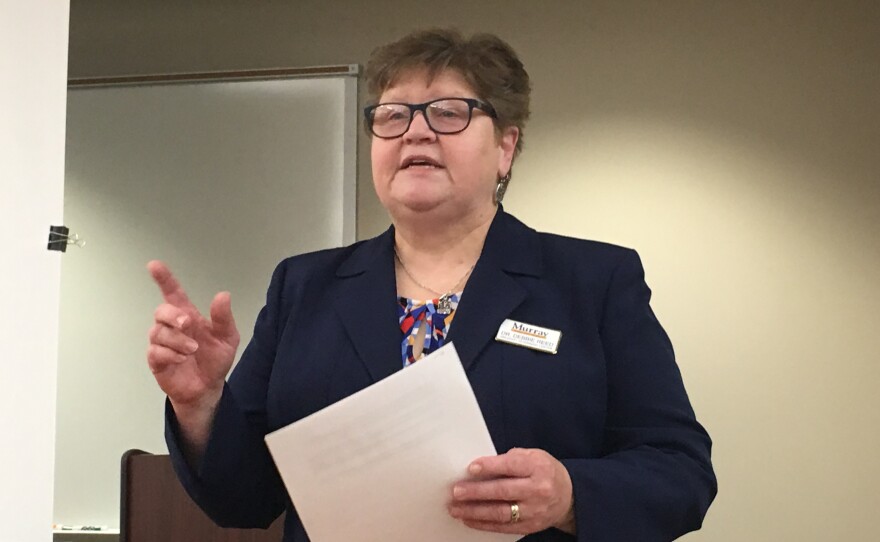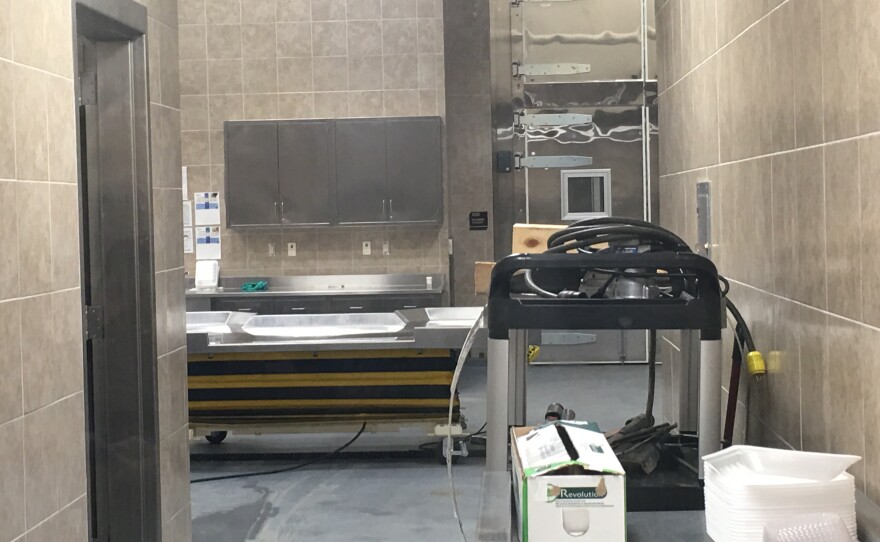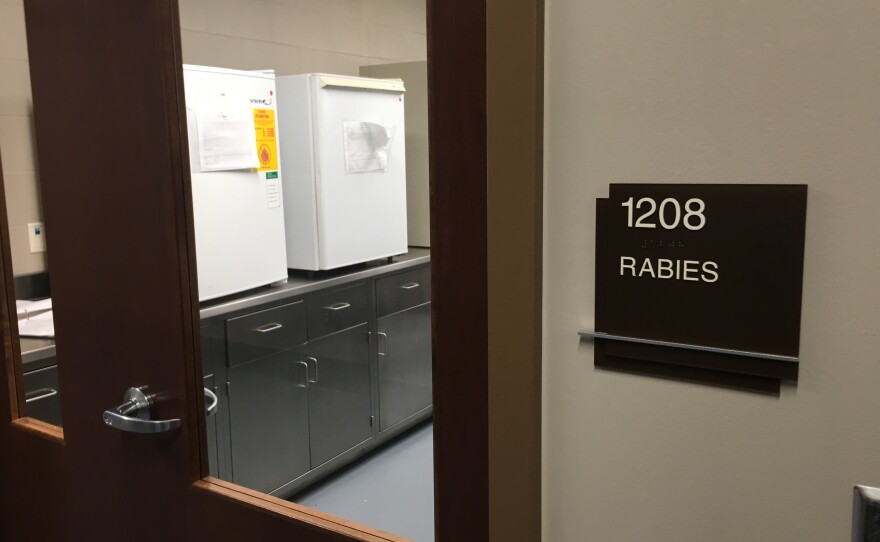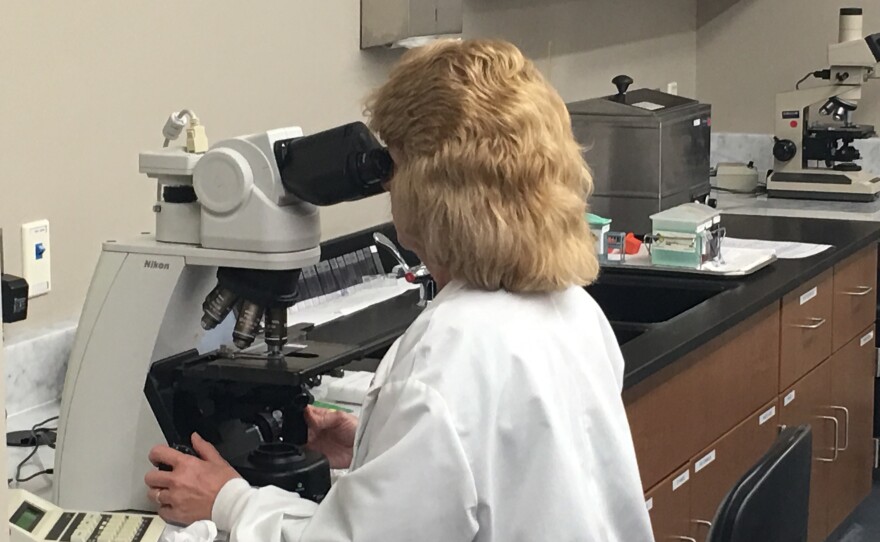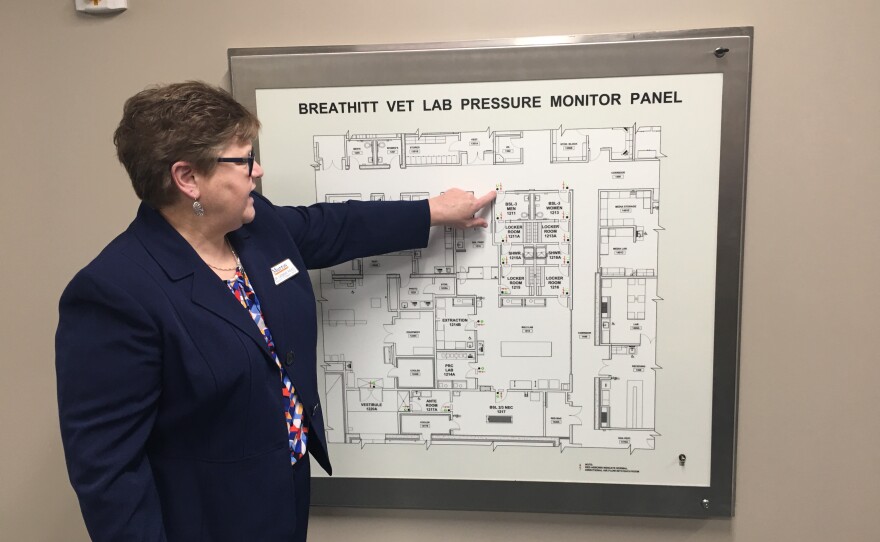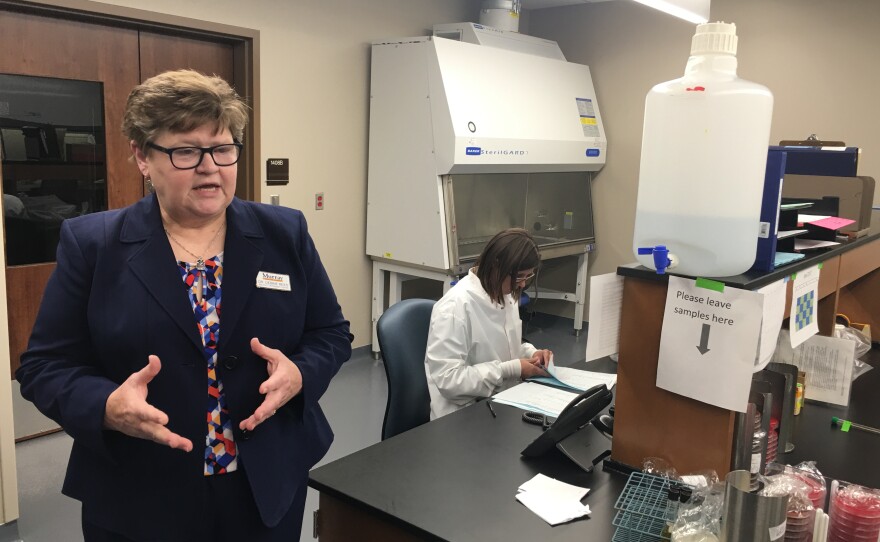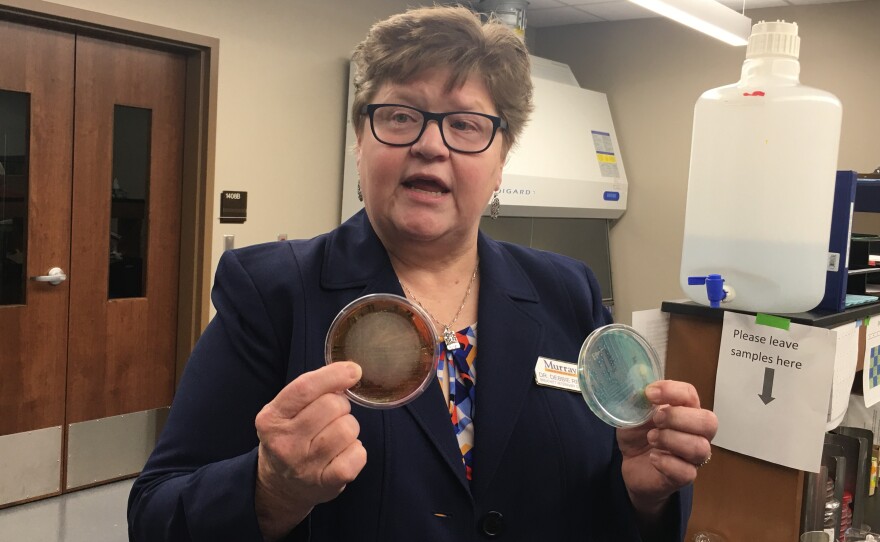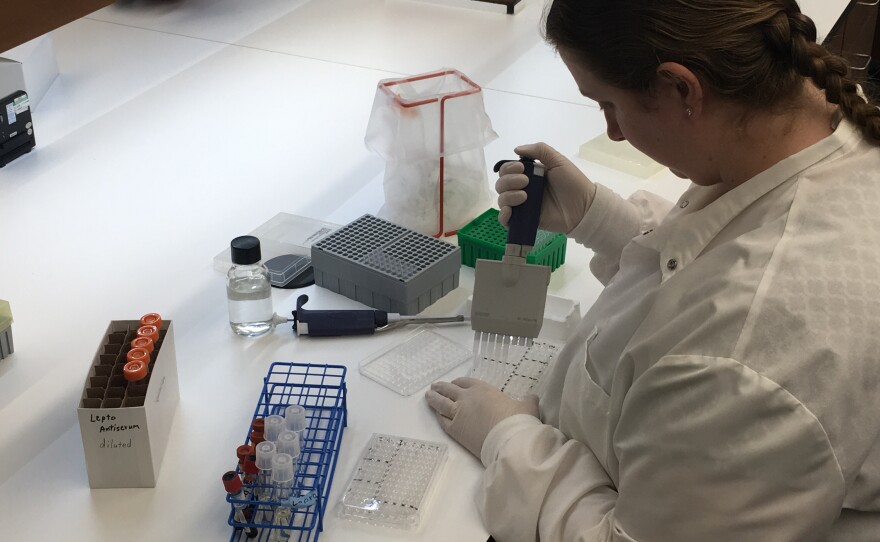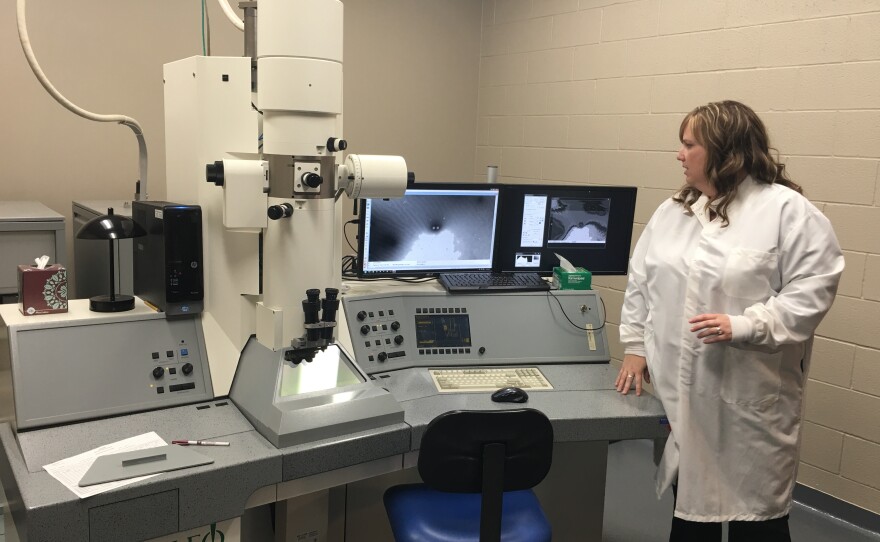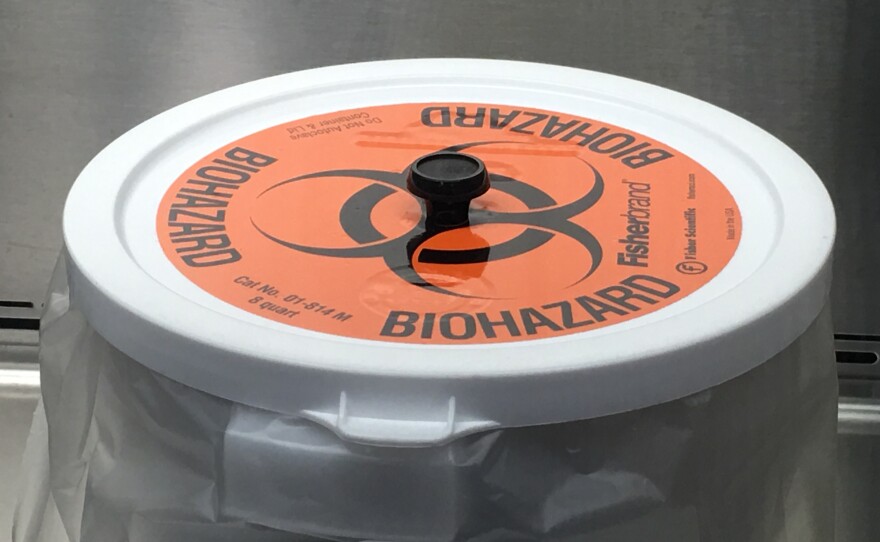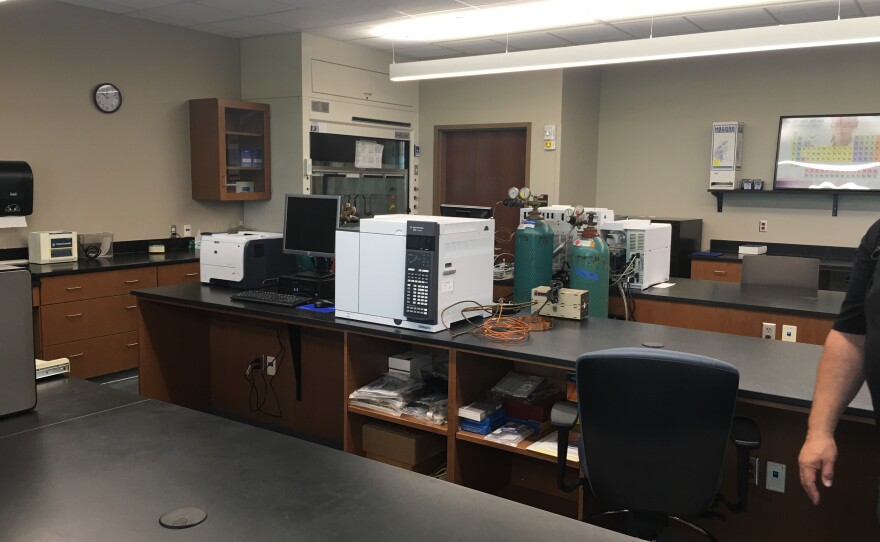Murray State University’s new 77,000 square foot animal disease diagnostic laboratory is formally open. Governor Matt Bevin, MSU President Dr. Bob Davies and other state and university officials held a ribbon-cutting ceremony and dedication for the Breathitt Veterinary Center in Hopkinsville on Thursday.
(Note: Photos in slideshow above from a recent media tour.)
The new center has been in operation for a few months, as veterinarians and staff moved-in at the end of February. There are around eight veterinarians and 40 staff members. The new $32 million building replaces a nearby smaller one (44,000 square feet) that had been in operation since 1968.
A unique feature of the new building is a Biosafety Level III Suite (BSL-3) designed to handle high impact disease and bioterrorism agents. The lab looks like a large open room with a glove box and an attached necropsy room and walk-in cooler.
.@murraystateuniv's Breathitt Veterinary positions KY to be national leader in animal disease diagnostics. Pleased to attend dedication! pic.twitter.com/nm4S6Ollwf
— Governor Matt Bevin (2015-2019) (@GovMattBevin) May 11, 2017
Director Debbie Reed said in a recent media tour the unit has its own HVAC and shower-in and out system. The primary purpose is to contain the work done in the lab, including foreign animal diseases. “If a technician were working with a sample in that section it’s much less likely to get spread out to anybody else. Our folks tend to be agriculture people and have livestock at home so we want to be careful that we don’t cart anything home with our people," Reed said.
Reed said Breathitt's BSL-III is the only one in the state designed for veterinary medicine. There is another BSL-III in Louisville designed for human diagnostics.
The center identified the low pathogenic avian flu outbreak earlier this year in Christian County. Reed said without Breathitt, testing would have been sent elsewhere. The next closest facility geographically is in Nashville - there is also a lab at University of Kentucky. Most of the poultry they receive is from west Kentucky and the BSL-III makes it easier to do such testing.
She said poultry processor technicians routinely select around two dozen birds for testing before they reach grocery stores. If there is a death loss or a reduction in egg laying, birds are sent to Breathitt to determine why.
With regards to the outbreak in Christian County, she said they tested large numbers of birds for three weeks from the two affected farms. Subsequent follow-up tests determined negative and clean birds that can now "move freely."
Reflecting on the event, she said, "I think all of our poultry people are probably still a little on alert. Paying more attention to the death loss. Paying more attention to the sick birds... and increasing their biosecurity."
If testing is positive for avian flu, a final diagnosis is then sent to a national lab, however Breathitt was able to provide a presumptive diagnosis within a day. Given the large number of poultry and livestock in west Kentucky, Breathitt is in a strategic industry location.
"Because the poultry industry is so big in western Kentucky, we do a huge amount of poultry work," Reed said, adding that about 40% of the overall work involves the poultry industry (necropsies and blood samples). They receive roughly 1,300 to 1,500 blood samples from chickens each week.
The other 60% includes beef cattle, dairy, swine, goats, dogs and cats. She said there were 800 necropsies last year.
According to Murray State, Breathitt handled 16,000 cases in the past year. Reed said a "case" can be a single blood sample or 300 milk samples or a dead animal brought in for a necropsy.
President Donald Trump's proposed budget includes a 21% cut to the USDA including testing for avian influenza and animal and plant inspections. There is approximately $80 to $90 million dollars for avian flu testing and the proposal calls for eliminating all remaining funds. Kentucky and Tennessee are part of the "All in or All Gone" campaign, which stresses the importance of testing. Another $50 million is stricken for the Animal and Plant Health Inspection Service.
Breathitt receives USDA funding for testing avian flu. In terms of a contingency plan, Reed said there are different tests that can be done. The recent outbreaks involved a molecular diagnostics of PCR. She said there are other tests but they aren't as good. She said the center also works with the National Animal Health Laboratory Network (NAHLN) which could also be affected by cuts and the National Organic Program (NOP) which could be at danger.
"I would hope that our officials have enough foresight to see the value of veterinary laboratories all across the nation. Not just ours, not just in Kentucky," she said.
As universities braced for state appropriation cuts last year, there was an effort by MSU officials and local legislators to make Breathitt Veterinary Center a separate item for funding due to it's unique nature and service. According to a Board of Regents meeting in February 2016, BVC cost $3.6 million in state funding. When asked if this would be again considered at the state-level, Murray State Dean of the Hutson School of Agriculture Dr. Tony Brannon said "We don't know potential ramifications of new building yet" in terms of electric and utility cost and an analysis of operational costs.
Brannon said Breathitt began as a veterinary diagnostic lab and expanded into research and education. He said, "As far as I'm aware, we are the only regional university with an accredited veterinary technology academic program and a nationally accredited veterinary diagnostic lab. Typically you see that at land grant institutions: Perdue, Auburn."
He said there are 1,033 students enrolled in the department as of last fall, around one-third are pre-vet or vet majors. Students connect to Breathitt through computer learning and about 20 to 26 are enrolled in the "Breathitt experience" each semester.

